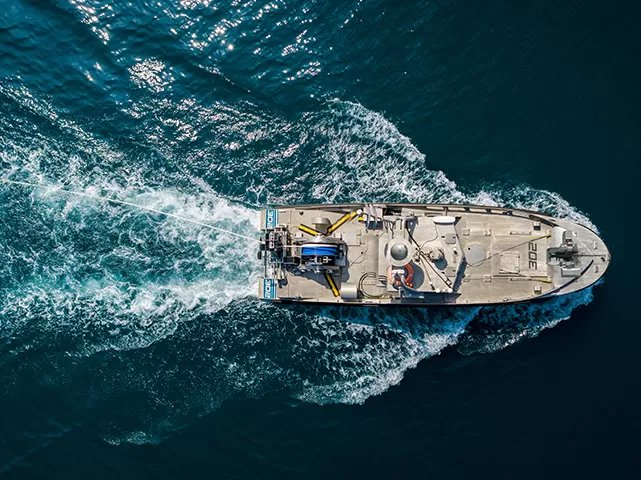
All Hands Off Deck
For Elbit Systems' Naval Solutions, the future is clear: unmanned platforms will become more dominant in the maritime battlefield. The Seagull™ USV is their answer to these on-growing challenges.
Securing shorelines and naval trade routes is vital for certain nations, given the significant economic impact associated with these crucial areas. The swift evolution of unmanned vehicle technology in recent years has opened doors to enhancing naval warfare operations while reducing human risk. Especially in tasks where precision and endurance are key, the adoption of such technology plays a crucial role in lessening the necessity to expose human personnel to potential dangers for the sake of defense.
"Leveraging the expertise gained from our prior UAS technologies, we have developed a product that has the potential to significantly contribute to the realm of naval warfare and defense," says Saar, Vice President at Elbit Systems – ISTAR & EW and Head of Elbit's Naval Systems.
The system Saar refers to is the Seagull™, an Unmanned Surface Vehicle (USV) designed for maritime applications. "Our objective is to fully harness various effective technologies and intelligently integrate them into maritime defense system. The Seagull™ is a prime example of this approach," Saar explains.
Less Risk, More Performance
Saar and his team have pinpointed a key challenge in contemporary naval operations: a prevailing conservatism. Many tasks that could be efficiently executed by unmanned platforms are still being performed by manned platforms with sailors onboard.
"This adherence to traditional methods is understandable," he claims. "Humanity's millennia-long history of seafaring naturally makes the naval sector more resistant to changes in mindset. In contrast, aviation, a relatively newer field with less than two centuries of history, has rapidly embraced unmanned technology for most of its military objectives."
Amir, a Senior Director of Business Development at Elbit Systems' Naval Systems, identifies sea mine clearance, anti-submarine and electronic warfare as main tasks ideally suited for unmanned surface vehicles like the Seagull™.
"While traditional mine-sweeping missions can pose substantial risks to personnel, delegating this responsibility to a USV like the Seagull™ not only enhances safety but also leads to improved performance," he says.
These solutions excel not only in neutralizing sea mines but also in addressing broader military naval threats, such as enemy submarines. this USV can perform low-risk Anti Sub-Marine (ASW) missions, with enhanced detection capabilities. This skill can provide navies significant tactical advantage by effectively deterring and threatening enemy submarines with lower risk.
"A dramatic advantage of the Seagull™ is its capacity to carry a considerable payload of munitions," Amir elaborates. "Equipped to launch torpedoes like traditional combat naval vessels, the Seagull™ can provide support in a diverse array of maritime combat situations."
The World Is Going Unmanned
Elbit Naval Systems' experts have observed an increasing demand for sustainable and dependable maritime defense systems. "We have demonstrated the Seagull's™ capabilities to numerous navies around the world, showcasing the versatility and value of our solutions," Saar says.
Amir provides a pertinent example: "Consider the situation in the Black Sea during the Russian invasion of Ukraine. This vital trade route, extensively used by many Asian countries, now faces threats from the widespread deployment of sea mines, making it dangerously inaccessible. Instead of incurring the risks to human life and the high costs associated with securing this maritime passage, these nations could benefit from adopting innovative solutions to safeguard their economic interests and promote continued prosperity."
In the military sphere, contemporary armed forces face the significant task of assembling a robust fleet of unmanned maritime vehicles. These are essential for countering the growing threats posed by enemy unmanned systems.
"Today, it's evident that certain nations possess a formidable array of unmanned platforms capable of disrupting international trade routes, which could severely impact global economic interests," Saar observes.
Amir concludes with a forward-looking statement: "Our commitment to enhancing our solutions is unwavering. The scope of missions achievable with our products is expanding, and our goal is to make them increasingly versatile. It’s becoming apparent that, much like the aerial battlefield has transitioned to unmanned systems, we can carefully anticipate that maybe a similar evolution would occur in the naval arena."
The content of the article does not constitute business or financial information about Elbit Systems Ltd. (the "Company") and is not intended to be a basis for making investment decisions in the Company's securities. In order to obtain business or financial information about the Company, please refer to the reports and filings that the Company regularly publishes on the website of the U.S Securities and Exchange Commission (EDGAR) and on the notification system of the Tel Aviv Stock Exchange (Maya).
The article may contain forward-looking statements such as estimates, forecasts, estimates, plans, etc. that refer to future events that are considered forward-looking information as defined under the securities laws of Israel and the United States. There is no certainty that such information will be realized, in whole or in part, and the actual result may differ from what was presented in the article, among other things due to its dependence on external factors that are not under the control of the Company and that cannot be evaluated in advance. The forward-looking statements are based on the Company's estimates at the time of publication, and the Company has no obligation to update or correct this data.

